Boyle J.A. The Cambridge History of Iran, Volume 5: The Saljuq and Mongol Periods
Подождите немного. Документ загружается.

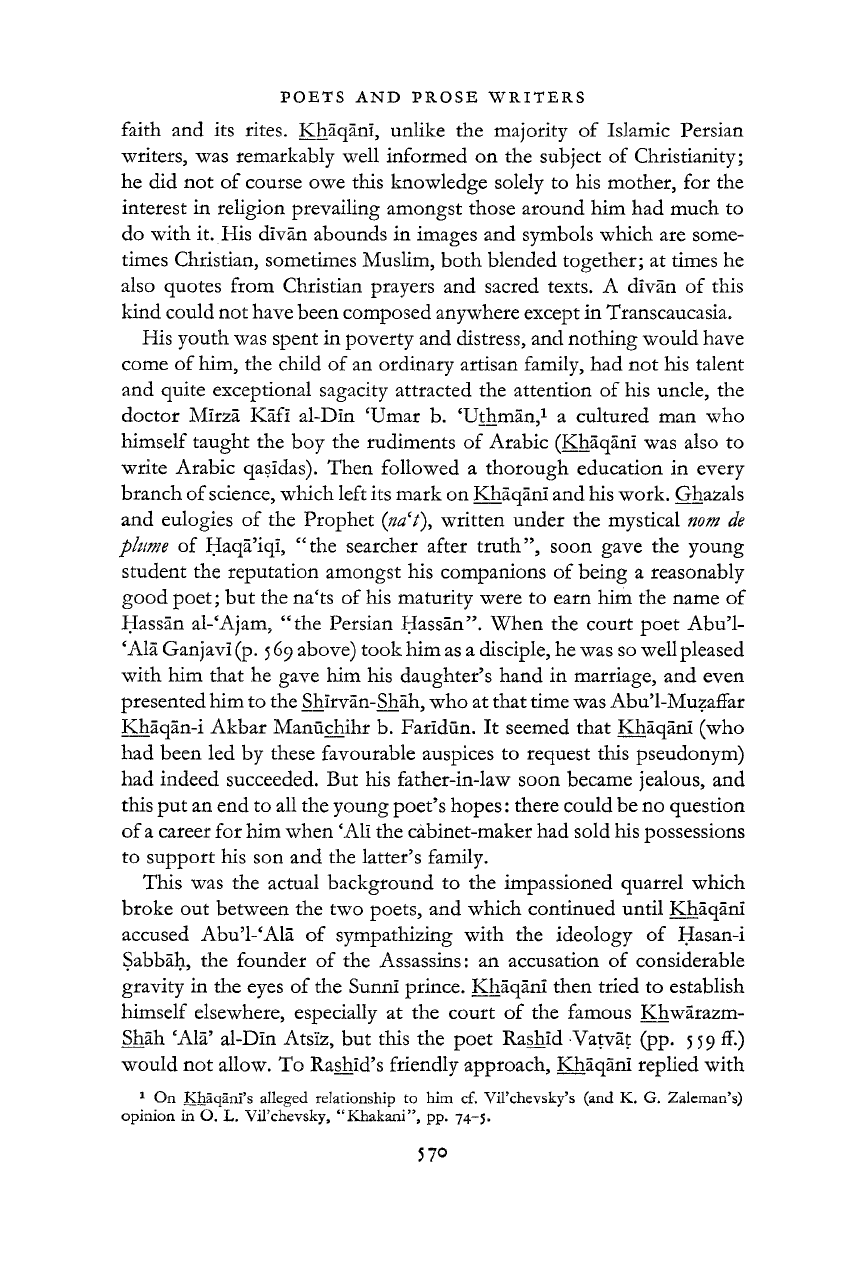
POETS
AND
PROSE WRITERS
57°
faith
and its
rites. Khâgâni, unlike
the
majority
of
Islamic Persian
writers,
was
remarkably well informed
on the
subject
of
Christianity;
he
did not of
course
owe
this knowledge solely
to his
mother,
for the
interest
in
religion prevailing amongst those around
him had
much
to
do with
it. His
divân abounds
in
images
and
symbols which
are
some-
times Christian, sometimes Muslim, both blended together;
at
times
he
also quotes from Christian prayers
and
sacred texts.
A
divân
of
this
kind could not have been composed anywhere except
in
Transcaucasia.
His youth was spent
in
poverty
and
distress, and nothing would have
come
of
him,
the
child
of
an ordinary artisan family,
had not his
talent
and quite exceptional sagacity attracted
the
attention
of
his uncle,
the
doctor Mirza Kâfi al-Din 'Umar
b.
'Uthmân,
1
a
cultured
man who
himself taught
the boy the
rudiments
of
Arabic (Khâgâni
was
also
to
write Arabic qasidas). Then followed
a
thorough education
in
every
branch
of
science, which left its mark
on
Khâgâni and his work. Ghazals
and eulogies
of the
Prophet
(na't),
written under
the
mystical
nom de
plume
of
Hagâ'igi,
"the
searcher after truth", soon gave
the
young
student
the
reputation amongst
his
companions
of
being
a
reasonably
good poet;
but the
na
c
ts
of
his maturity were
to
earn
him the
name
of
Hassan al-'Ajam,
"the
Persian Hassan". When
the
court poet Abu'l-
'Alâ Ganjavi
(p.
5
69
above) took him as
a
disciple,
he
was
so
well pleased
with
him
that
he
gave
him his
daughter's hand
in
marriage,
and
even
presented him
to
the Shîrvân-Şhâh, who
at
that time was Abu'l-Muzaffar
Khâgân-i Akbar Manûchihr
b.
Faridün.
It
seemed that Khâgâni
(who
had been
led by
these favourable auspices
to
reguest this pseudonym)
had indeed succeeded.
But his
father-in-law soon became jealous,
and
this put an end
to all
the young poet's hopes: there could
be no
guestion
of
a
career
for
him when
c
Ali
the
cabinet-maker had sold his possessions
to support
his son and the
latter's family.
This
was the
actual background
to the
impassioned guarrel which
broke
out
between
the two
poets,
and
which continued until Khâgâni
accused Abu'l-'Alâ
of
sympathizing with
the
ideology
of
Hasan-i
Şabbâh,
the
founder
of the
Assassins:
an
accusation
of
considerable
gravity
in the
eyes
of
the Sunni prince. Khâgâni then tried
to
establish
himself elsewhere, especially
at the
court
of the
famous Khwarazm-
Shâh
'Ala'
al-Din Atsiz,
but
this
the
poet Raşhid Vatvât
(pp.
559
ff.)
would
not
allow.
To
Raşhid's friendly approach, Khâgâni replied with
1
On
Khaqam's alleged relationship
to him cf.
Vil'chevsky's
(and K. G.
Zaleman's)
opinion
in O. L.
Vil'chevsky, "Khakani",
pp. 74-5.
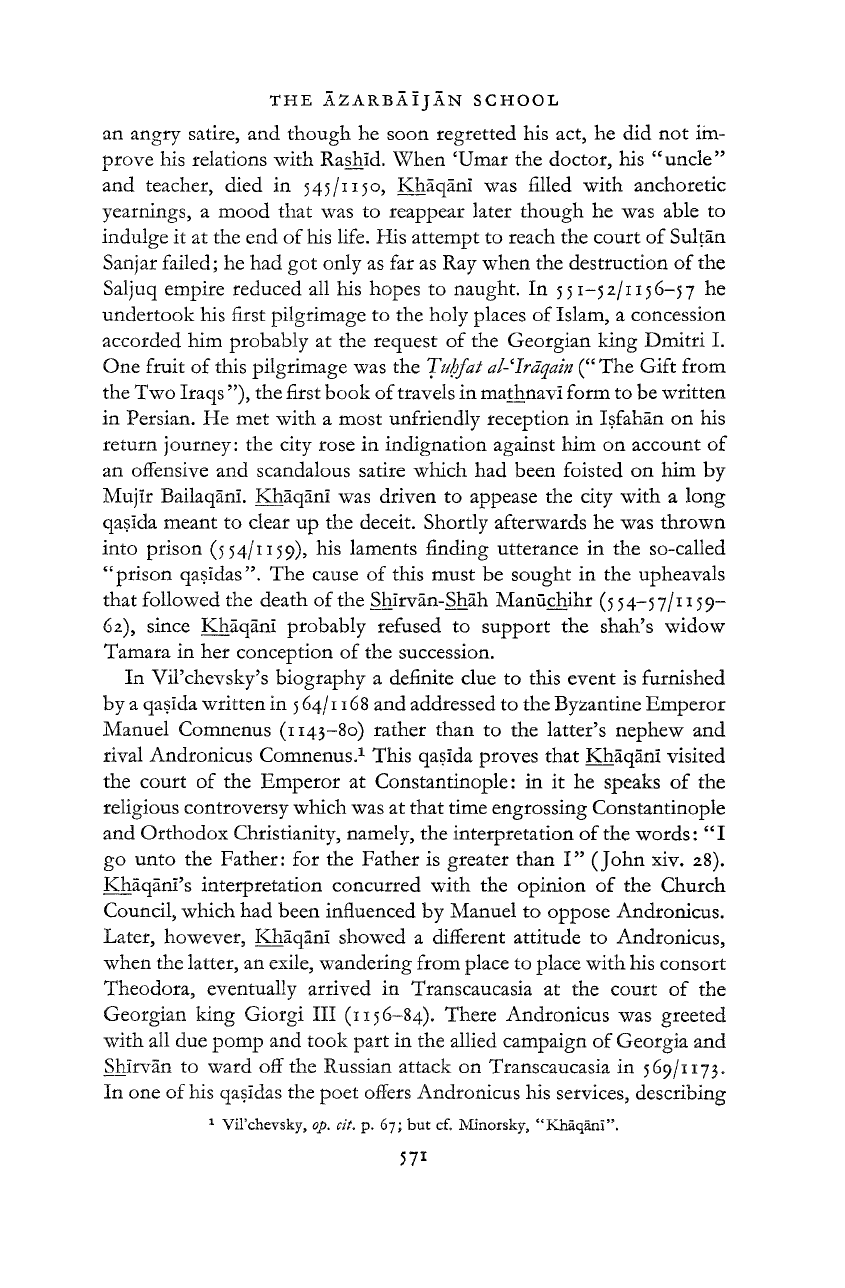
THE AZARB
AIJ AN
SCHOOL
571
an angry satire,
and
though
he
soon regretted
his act, he did not im-
prove
his
relations with Rashid. When 'Umar
the
doctor,
his
"uncle"
and teacher, died
in
545/1150, Khaqani
was
filled with anchoretic
yearnings,
a
mood that
was to
reappear later though
he was
able
to
indulge
it at the end of
his life.
His
attempt
to
reach
the
court
of
Sultan
Sanjar failed;
he had got
only
as far as Ray
when
the
destruction
of
the
Saljuq empire reduced
all his
hopes
to
naught.
In
551-52/1156-57
he
undertook
his
first pilgrimage
to the
holy places
of
Islam,
a
concession
accorded
him
probably
at the
request
of the
Georgian king Dmitri
I.
One fruit
of
this pilgrimage
was the Tuhfat al-Irdqain ("The
Gift from
the
Two
Iraqs
"),
the
first book of travels
in
mathnavi form
to be
written
in Persian.
He met
with
a
most unfriendly reception
in
Isfahan
on his
return journey:
the
city rose
in
indignation against
him on
account
of
an offensive
and
scandalous satire which
had
been foisted
on him by
Mujir Bailaqani. Khaqani
was
driven
to
appease
the
city with
a
long
qasida meant
to
clear
up the
deceit. Shortly afterwards
he was
thrown
into prison (554/1159),
his
laments finding utterance
in the
so-called
"prison qasidas".
The
cause
of
this must
be
sought
in the
upheavals
that followed
the
death
of
the Shirvan-Shah Manuchihr (5 54-57/1159-
62),
since Khaqani probably refused
to
support
the
shah's widow
Tamara
in her
conception
of the
succession.
In Vil'chevsky's biography
a
definite clue
to
this event
is
furnished
by
a
qasida written
in
5
64/1168 and addressed
to
the Byzantine Emperor
Manuel Comnenus (1143-80) rather than
to the
latter's nephew
and
rival Andronicus Comnenus.
1
This qasida proves that Khaqani visited
the court
of the
Emperor
at
Constantinople:
in it he
speaks
of the
religious controversy which was
at
that time engrossing Constantinople
and Orthodox Christianity, namely,
the
interpretation
of
the words:
"I
go unto
the
Father:
for the
Father
is
greater than
I"
(John
xiv. 28).
Khaqani's interpretation concurred with
the
opinion
of the
Church
Council, which
had
been influenced
by
Manuel
to
oppose Andronicus.
Later, however, Khaqani showed
a
different attitude
to
Andronicus,
when the latter,
an
exile, wandering from place
to
place with his consort
Theodora, eventually arrived
in
Transcaucasia
at the
court
of the
Georgian king Giorgi
III
(1156-84). There Andronicus
was
greeted
with
all due
pomp
and
took part
in the
allied campaign
of
Georgia
and
Shirvan
to
ward
off the
Russian attack
on
Transcaucasia
in
569/1173.
In
one of
his qasidas
the
poet offers Andronicus
his
services, describing
1
ViPchevsky, op.
cit. p. 67; but cf.
Minorsky, "Khaqani".
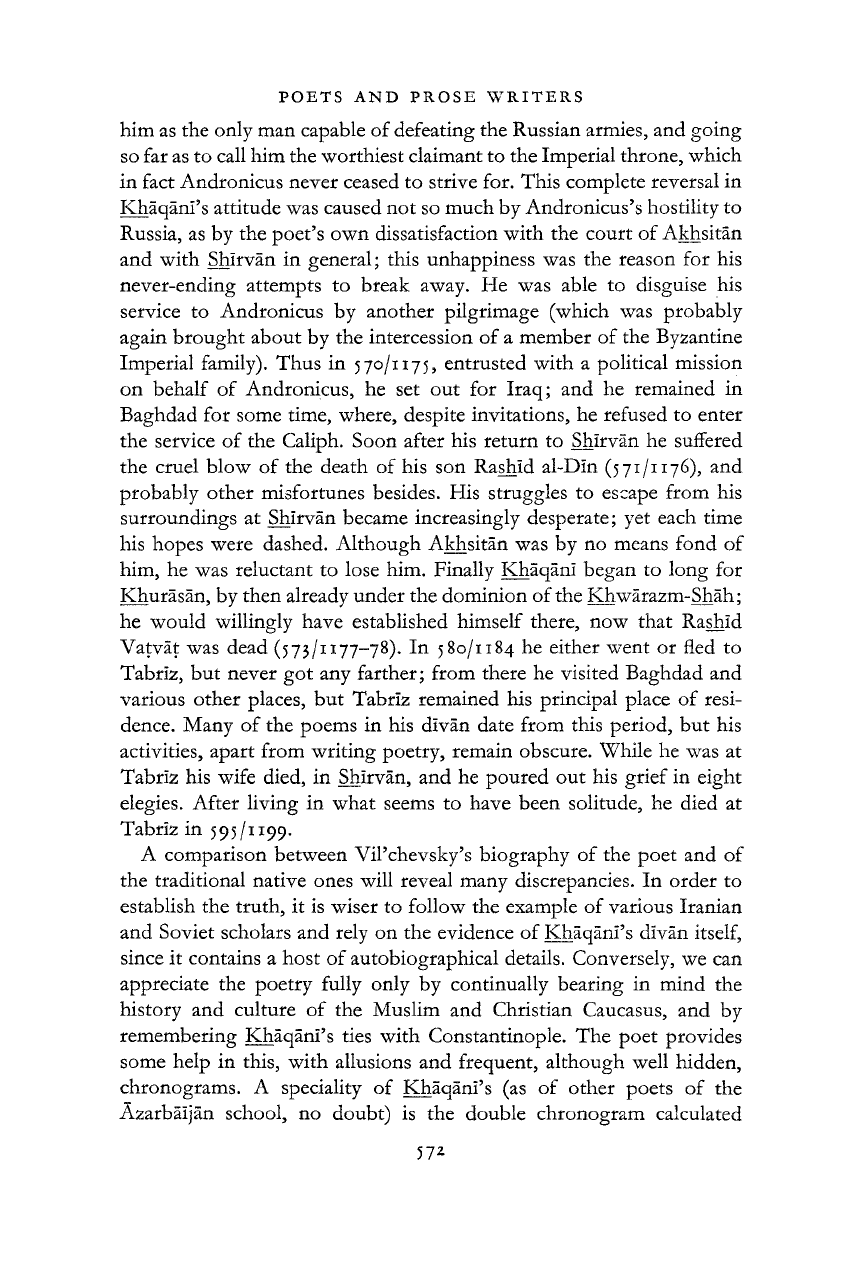
POETS AND PROSE WRITERS
572
him as the only man capable of defeating the Russian armies, and going
so far as to call him the worthiest claimant to the Imperial throne, which
in fact Andronicus never ceased to strive for. This complete reversal in
Khaqani's attitude was caused not so much by Andronicus's hostility to
Russia, as by the poet's own dissatisfaction with the court of A
khsitan
and with Shirvan in general; this unhappiness was the reason for his
never-ending attempts to break away. He was able to disguise his
service to Andronicus by another pilgrimage (which was probably
again brought about by the intercession of a member of the Byzantine
Imperial family). Thus in 570/1175, entrusted with a political mission
on behalf of Andronicus, he set out for Iraq; and he remained in
Baghdad for some time, where, despite invitations, he refused to enter
the service of the Caliph. Soon after his return to Shirvan he suffered
the cruel blow of the death of his son Rashid al-Din
(5
71/1176), and
probably other misfortunes besides. His struggles to escape from his
surroundings at Shirvan became increasingly desperate; yet each time
his hopes were dashed. Although Akhsitan was by no means fond of
him, he was reluctant to lose him. Finally Khaqani began to long for
Khurasan, by then already under the dominion of the Khwarazm-
Shah;
he would willingly have established himself there, now that Rashid
Vatvat was dead (573/1177-78). In 580/1184 he either went or fled to
Tabriz, but never got any farther; from there he visited Baghdad and
various other places, but Tabriz remained his principal place of resi-
dence. Many of the poems in his divan date from this period, but his
activities, apart from writing poetry, remain obscure. While he was at
Tabriz his wife died, in Shirvan, and he poured out his grief in eight
elegies. After living in what seems to have been solitude, he died at
Tabriz in 595/1199.
A comparison between ViPchevsky's biography of the poet and of
the traditional native ones will reveal many discrepancies. In order to
establish the truth, it is wiser to follow the example of various Iranian
and Soviet scholars and rely on the evidence of Khaqani's divan
itself,
since it contains a host of autobiographical details. Conversely, we can
appreciate the poetry fully only by continually bearing in mind the
history and culture of the Muslim and Christian Caucasus, and by
remembering Khaqani's ties with Constantinople. The poet provides
some help in this, with allusions and frequent, although well hidden,
chronograms. A speciality of Khaqani's (as of other poets of the
Azarbaijan school, no doubt) is the double chronogram calculated
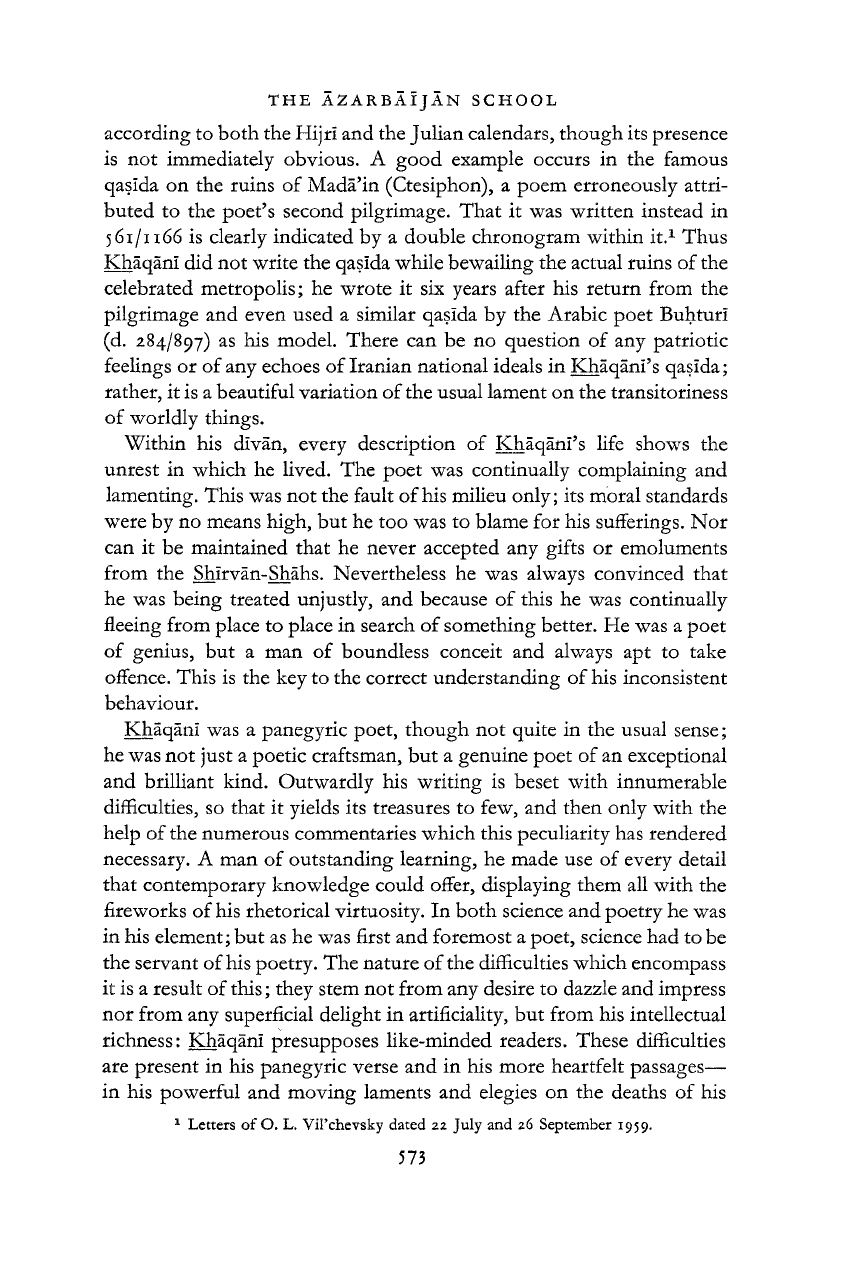
THE A2ARBAIJAN SCHOOL
573
according to both the Hijri and the Julian calendars, though its presence
is not immediately obvious. A good example occurs in the famous
qasida on the ruins of Mada'in (Ctesiphon), a poem erroneously attri-
buted to the poet's second pilgrimage. That it was written instead in
561/1166 is clearly indicated by a double chronogram within it.
1
Thus
Khaqani did not write the qasida while bewailing the actual ruins of the
celebrated metropolis; he wrote it six years after his return from the
pilgrimage and even used a similar qasida by the Arabic poet Buhturi
(d. 284/897) as his model. There can be no question of any patriotic
feelings or of any echoes of Iranian national ideals in Khaqani
7
s qasida;
rather, it is a beautiful variation of the usual lament on the transitoriness
of worldly things.
Within his divan, every description of Khaqani's life shows the
unrest in which he lived. The poet was continually complaining and
lamenting. This was not the fault of his milieu only; its moral standards
were by no means high, but he too was to blame for his sufferings. Nor
can it be maintained that he never accepted any gifts or emoluments
from the Shirvan-Shahs. Nevertheless he was always convinced that
he was being treated unjustly, and because of this he was continually
fleeing from place to place in search of something better. He was a poet
of genius, but a man of boundless conceit and always apt to take
offence. This is the key to the correct understanding of his inconsistent
behaviour.
Khaqani was a panegyric poet, though not quite in the usual sense;
he was not just a poetic craftsman, but a genuine poet of an exceptional
and brilliant kind. Outwardly his writing is beset with innumerable
difficulties, so that it yields its treasures to few, and then only with the
help of the numerous commentaries which this peculiarity has rendered
necessary. A man of outstanding learning, he made use of every detail
that contemporary knowledge could offer, displaying them all with the
fireworks of his rhetorical virtuosity. In both science and poetry he was
in his element; but as he was first and foremost a poet, science had to be
the servant of his poetry. The nature of the difficulties which encompass
it is a result of this; they stem not from any desire to dazzle and impress
nor from any superficial delight in artificiality, but from his intellectual
richness: Khaqani presupposes like-minded readers. These difficulties
are present in his panegyric verse and in his more heartfelt passages—
in his powerful and moving laments and elegies on the deaths of his
1
Letters of O. L. Vil'chevsky dated 22 July and 26 September 1959.
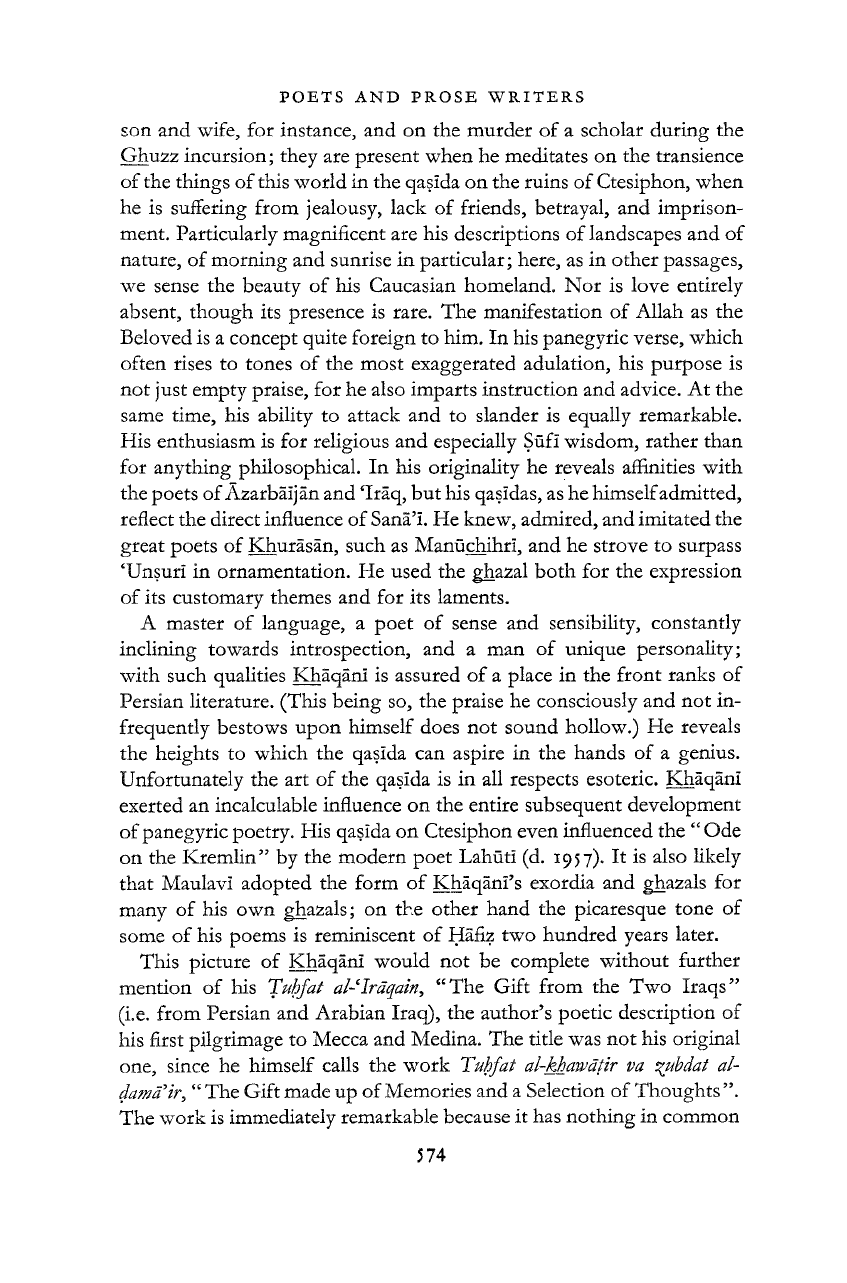
POETS
AND
PROSE WRITERS
574
son
and
wife,
for
instance,
and on the
murder
of a
scholar during
the
Ghuzz incursion; they
are
present when
he
meditates
on the
transience
of the things
of
this world
in
the qasida
on
the ruins
of
Ctesiphon, when
he
is
suffering from jealousy, lack
of
friends, betrayal,
and
imprison-
ment. Particularly magnificent
are his
descriptions
of
landscapes
and of
nature,
of
morning
and
sunrise
in
particular; here,
as in
other passages,
we sense
the
beauty
of his
Caucasian homeland.
Nor is
love entirely
absent, though
its
presence
is
rare.
The
manifestation
of
Allah
as the
Beloved
is a
concept quite foreign
to
him.
In
his panegyric verse, which
often rises
to
tones
of the
most exaggerated adulation,
his
purpose
is
not just empty praise,
for he
also imparts instruction
and
advice.
At the
same time,
his
ability
to
attack
and to
slander
is
equally remarkable.
His enthusiasm
is for
religious
and
especially Sufi wisdom, rather than
for anything philosophical.
In his
originality
he
reveals affinities with
the poets of Azarbaijan and 'Iraq, but his qasidas, as he himself admitted,
reflect the direct influence
of
Sana'i.
He
knew, admired, and imitated the
great poets
of
Khurasan, such
as
Manuchihri,
and he
strove
to
surpass
'Unsuri
in
ornamentation.
He
used
the
ghazal both
for the
expression
of its customary themes
and for its
laments.
A master
of
language,
a
poet
of
sense
and
sensibility, constantly
inclining towards introspection,
and a man of
unique personality;
with such qualities Khaqani
is
assured
of a
place
in the
front ranks
of
Persian literature. (This being
so, the
praise
he
consciously
and not in-
frequently bestows upon himself does
not
sound hollow.)
He
reveals
the heights
to
which
the
qasida
can
aspire
in the
hands
of a
genius.
Unfortunately
the art of the
qasida
is in all
respects esoteric. Khaqani
exerted
an
incalculable influence
on the
entire subsequent development
of panegyric poetry.
His
qasida
on
Ctesiphon even influenced the
"
Ode
on
the
Kremlin"
by the
modern poet Lahuti
(d.
1957).
It is
also likely
that Maulavi adopted
the
form
of
Khaqani's exordia
and
ghazals
for
many
of his own
ghazals;
on the
other hand
the
picaresque tone
of
some
of his
poems
is
reminiscent
of
Hafiz
two
hundred years later.
This picture
of
Khaqani would
not be
complete without further
mention
of his Tuhfat al-Irdqain^ "The
Gift from
the Two
Iraqs"
(i.e.
from Persian
and
Arabian Iraq),
the
author's poetic description
of
his first pilgrimage
to
Mecca
and
Medina.
The
title
was not his
original
one, since
he
himself calls
the
work
Tuhfat al-khawdtir va %ubdat al-
damd'ir,
"
The Gift made
up of
Memories and
a
Selection
of
Thoughts
".
The work
is
immediately remarkable because
it
has nothing
in
common
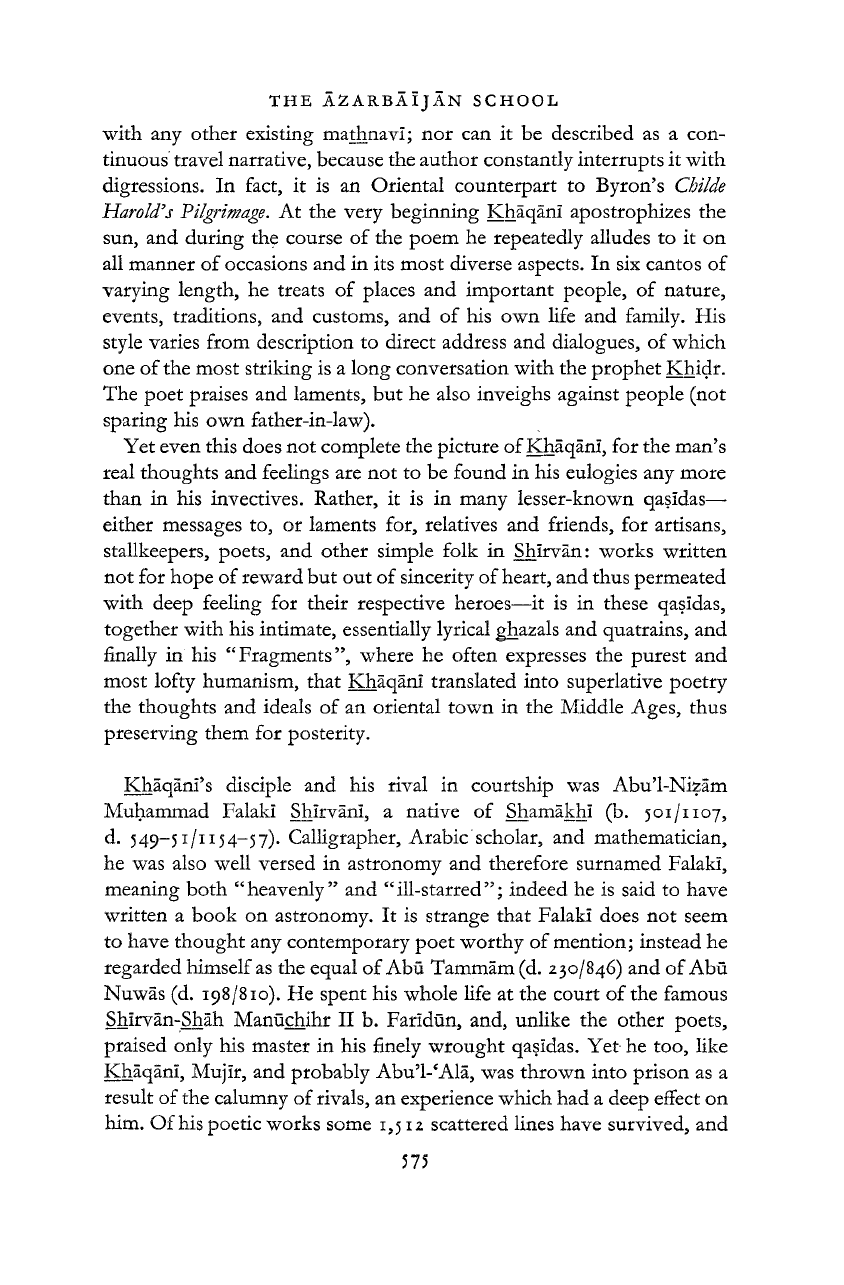
THE AZARBAIJ
AN
SCHOOL
575
with
any
other existing mathnavi;
nor can it be
described
as a
con-
tinuous travel narrative, because the author constantly interrupts
it
with
digressions.
In
fact,
it is an
Oriental counterpart
to
Byron's
Childe
Harold's Pilgrimage. At the
very beginning Khaqani apostrophizes
the
sun,
and
during
the
course
of the
poem
he
repeatedly alludes
to it on
all manner
of
occasions
and in its
most diverse aspects.
In six
cantos
of
varying length,
he
treats
of
places
and
important people,
of
nature,
events, traditions,
and
customs,
and of his own
life
and
family.
His
style varies from description
to
direct address
and
dialogues,
of
which
one
of
the most striking
is a
long conversation with
the
prophet Khidr.
The poet praises
and
laments,
but he
also inveighs against people
(not
sparing
his own
father-in-law).
Yet even this does
not
complete the picture of Khaqani,
for
the man's
real thoughts
and
feelings
are not to be
found
in his
eulogies
any
more
than
in his
invectives. Rather,
it is in
many lesser-known qasidas—
either messages
to, or
laments
for,
relatives
and
friends,
for
artisans,
stallkeepers, poets,
and
other simple folk
in
Shirvan: works written
not
for
hope
of
reward but
out of
sincerity
of
heart, and thus permeated
with deep feeling
for
their respective heroes—it
is in
these qasidas,
together with
his
intimate, essentially lyrical ghazals
and
quatrains,
and
finally in
his
"Fragments", where
he
often expresses
the
purest
and
most lofty humanism, that Khaqani translated into superlative poetry
the thoughts
and
ideals
of an
oriental town
in the
Middle Ages, thus
preserving them
for
posterity.
Khaqani's disciple
and his
rival
in
courtship
was
Abu'l-Nizam
Muhammad Falaki Shirvani,
a
native
of
Shamakhi
(b.
501/1107,
d. 549-51/1154-5
7).
Calligrapher, Arabic scholar,
and
mathematician,
he
was
also well versed
in
astronomy
and
therefore surnamed Falaki,
meaning both "heavenly"
and
"ill-starred"; indeed
he is
said
to
have
written
a
book
on
astronomy.
It is
strange that Falaki does
not
seem
to have thought
any
contemporary poet worthy
of
mention; instead
he
regarded himself as
the
equal
of
Abu. Tammam (d. 230/846)
and of
Abu.
Nuwas
(d.
198/810).
He
spent
his
whole life
at the
court
of
the famous
Shirvan-Shah Manuchihr
II b.
Faridun,
and,
unlike
the
other poets,
praised only
his
master
in his
finely wrought qasidas.
Yet he too,
like
Khaqani, Mujir,
and
probably Abu'l-'Ala,
was
thrown into prison
as a
result
of
the calumny
of
rivals,
an
experience which had
a
deep effect
on
him.
Of
his poetic works some
1,512
scattered lines have survived,
and
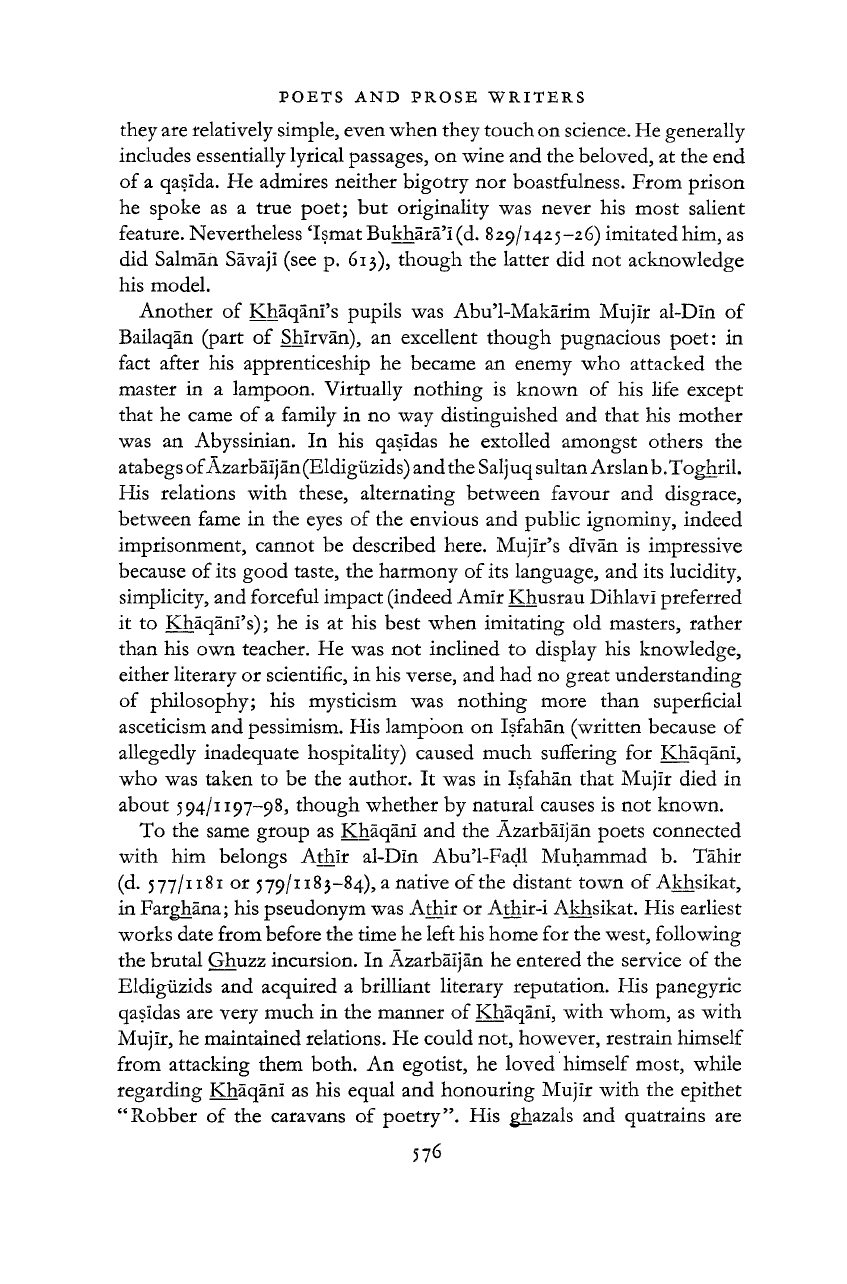
POETS AND PROSE WRITERS
576
they are relatively simple, even when they touch on science. He generally
includes essentially lyrical passages, on wine and the beloved, at the end
of a qasida. He admires neither bigotry nor boastfulness. From prison
he spoke as a true poet; but originality was never his most salient
feature. Nevertheless 'Ismat Bukhara'! (d. 829/1425-26) imitated him, as
did Salman Savaji (see p. 613), though the latter did not acknowledge
his model.
Another of Khaqani's pupils was Abu'l-Makarim Mujir al-Din of
Bailaqan (part of Shirvan), an excellent though pugnacious poet: in
fact after his apprenticeship he became an enemy who attacked the
master in a lampoon. Virtually nothing is known of his life except
that he came of a family in no way distinguished and that his mother
was an Abyssinian. In his qasidas he extolled amongst others the
atabegs of Azarbaij an (Eldigiizids) and the Salj uq sultan Arslan
b.
Toghril.
His relations with these, alternating between favour and disgrace,
between fame in the eyes of the envious and public ignominy, indeed
imprisonment, cannot be described here. Mujir's divan is impressive
because of its good taste, the harmony of its language, and its lucidity,
simplicity, and forceful impact (indeed Amir Khusrau Dihlavi preferred
it to Khaqani's); he is at his best when imitating old masters, rather
than his own teacher. He was not inclined to display his knowledge,
either literary or scientific, in his verse, and had no great understanding
of philosophy; his mysticism was nothing more than superficial
asceticism and pessimism. His lampoon on Isfahan (written because of
allegedly inadequate hospitality) caused much suffering for Khaqani,
who was taken to be the author. It was in Isfahan that Mujir died in
about 594/1197-98, though whether by natural causes is not known.
To the same group as Khaqani and the Azarbaijan poets connected
with him belongs Athir al-Din
Abu'1-Fadl
Muhammad b. Tahir
(d. 577/1181 or 579/1183-84), a native of the distant town of Akhsikat,
in Farghana; his pseudonym was Athir or Athir-i Akhsikat. His earliest
works date from before the time he left his home for the west, following
the brutal
Ghuzz incursion. In Azarbaijan he entered the service of the
Eldigiizids and acquired a brilliant literary reputation. His panegyric
qasidas are very much in the manner of Khaqani, with whom, as with
Mujir, he maintained relations. He could not, however, restrain himself
from attacking them both. An egotist, he loved himself most, while
regarding Khaqani as his equal and honouring Mujir with the epithet
"Robber of the caravans of poetry". His ghazals and quatrains are
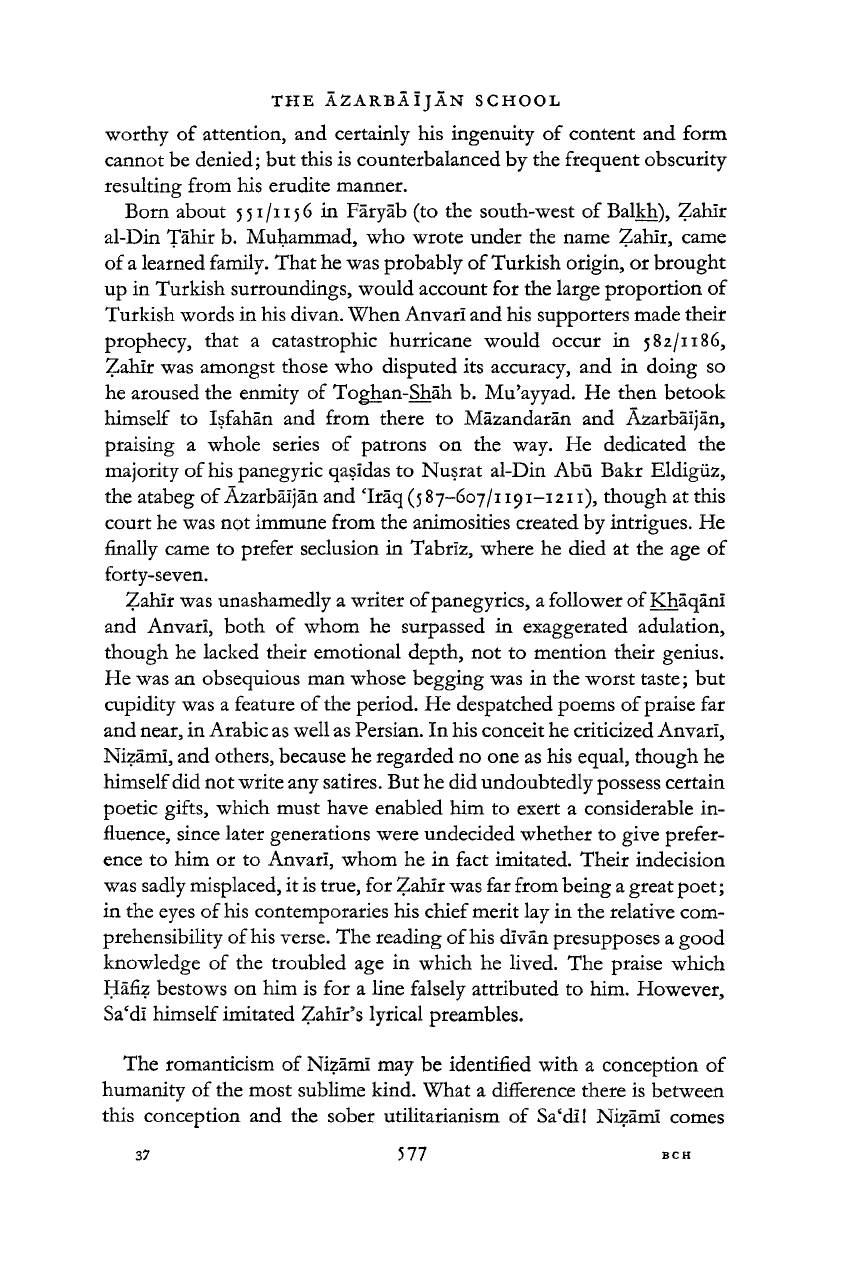
THE ÂZARBÂÎJAN SCHOOL
37
577
BCH
worthy of attention, and certainly his ingenuity of content and form
cannot be denied; but this is counterbalanced by the frequent obscurity
resulting from his erudite manner.
Born about
5 5
I/I156
in Fâryâb (to the south-west of Balkh), Zahir
al-Din Tâbir b. Muhammad, who wrote under the name Zahir, came
of a learned family. That he was probably of Turkish origin, or brought
up in Turkish surroundings, would account for the large proportion of
Turkish words in his divan. When Anvari and his supporters made their
prophecy, that a catastrophic hurricane would occur in 582/1186,
Zahir was amongst those who disputed its accuracy, and in doing so
he aroused the enmity of Toghan-Shâh b. Mu'ayyad. He then betook
himself to Isfahan and from there to Mâzandarân and Âzarbâîjân,
praising a whole series of patrons on the way. He dedicated the
majority of his panegyric qasidas to Nuşrat al-Din Abü Bakr Eldigüz,
the atabeg of Âzarbâîjân and 'Iraq
(5
87-607/1191-1211), though at this
court he was not immune from the animosities created by intrigues. He
finally came to prefer seclusion in Tabriz, where he died at the age of
forty-seven.
Zahir was unashamedly a writer of panegyrics, a follower of Khâgâni
and Anvari, both of whom he surpassed in exaggerated adulation,
though he lacked their emotional depth, not to mention their genius.
He was an obsequious man whose begging was in the worst taste; but
cupidity was a feature of the period. He despatched poems of praise far
and near, in Arabic as well as Persian. In his conceit he criticized Anvari,
Nizami, and others, because he regarded no one as his equal, though he
himself did not write any satires. But he did undoubtedly possess certain
poetic gifts, which must have enabled him to exert a considerable in-
fluence, since later generations were undecided whether to give prefer-
ence to him or to Anvari, whom he in fact imitated. Their indecision
was sadly misplaced, it is true, for
Zahir was far from being a great poet;
in the eyes of his contemporaries his chief merit lay in the relative com-
prehensibility of his verse. The reading of his
divân presupposes a good
knowledge of the troubled age in which he lived. The praise which
Hâfiz bestows on him is for a line falsely attributed to him. However,
Sa'di himself imitated Zahir's lyrical preambles.
The romanticism of Nizami may be identified with a conception of
humanity of the most sublime kind. What a difference there is between
this conception and the sober utilitarianism of Sa'di! Nizâmı comes
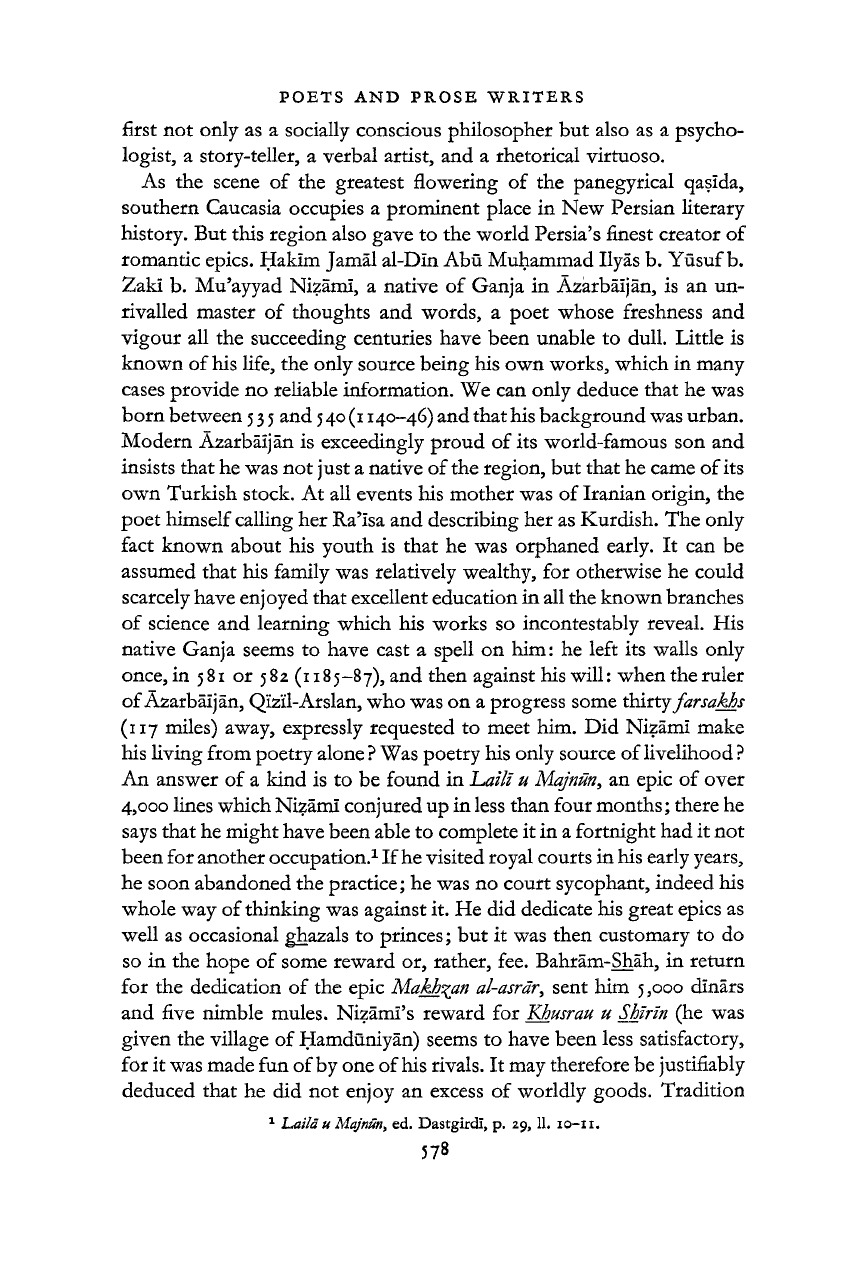
POETS
AND
PROSE WRITERS
578
first not only
as a
socially conscious philosopher
but
also
as a
psycho-
logist,
a
story-teller,
a
verbal artist,
and a
rhetorical virtuoso.
As
the
scene
of the
greatest flowering
of the
panegyrical qasida,
southern Caucasia occupies
a
prominent place
in New
Persian literary
history.
But
this region also gave
to the
world Persia's finest creator
of
romantic epics. Hakim Jamâl al-Din
Abü
Muhammad Ilyâs
b.
Yûsuf b.
Zaki
b.
Mu'ayyad Nizami,
a
native
of
Ganja
in
Azarbaijan,
is an un-
rivalled master
of
thoughts
and
words,
a
poet whose freshness
and
vigour
all the
succeeding centuries have been unable
to
dull. Little
is
known
of
his life,
the
only source being
his own
works, which
in
many
cases provide
no
reliable information.
We can
only deduce that
he was
born between 535 and
540
(1140-46) and that his background was urban.
Modern Azarbaijan
is
exceedingly proud
of
its world-famous
son and
insists that
he
was
not
just
a
native
of
the region,
but
that
he
came
of
its
own Turkish stock.
At all
events
his
mother
was of
Iranian origin,
the
poet himself calling
her
Ra'isa
and
describing
her as
Kurdish.
The
only
fact known about
his
youth
is
that
he was
orphaned early.
It can be
assumed that
his
family
was
relatively wealthy,
for
otherwise
he
could
scarcely have enjoyed that excellent education
in
all the known branches
of science
and
learning which
his
works
so
incontestably reveal.
His
native Ganja seems
to
have cast
a
spell
on him: he
left
its
walls only
once,
in 581 or
582 (1185-87),
and
then against his will: when the ruler
of Azarbaijan, Qizil-Arslan, who was
on a
progress some thirty
farsakhs
(117 miles) away, expressly requested
to
meet him.
Did
Nizamî make
his living from poetry alone
?
Was poetry his only source
of
livelihood
?
An answer
of a
kind
is to be
found
in
՝Laili
u Majnun, an
epic
of
over
4,000 lines which Nizami conjured up in less than four months; there
he
says that
he
might have been able
to
complete
it in a
fortnight had
it not
been
for
another occupation.
1
If he visited royal courts
in
his early years,
he soon abandoned
the
practice;
he was no
court sycophant, indeed
his
whole
way of
thinking
was
against it.
He did
dedicate
his
great epics
as
well
as
occasional ghazals
to
princes;
but it was
then customary
to do
so
in the
hope
of
some reward
or,
rather,
fee.
Bahrâm-Shâh,
in
return
for
the
dedication
of the
epic
Makh^an
al-asrâr^
sent
him
5,000 dinars
and five nimble mules. Nizâmi's reward
for Khusrau u Shmn (he was
given
the
village
of
Hamdüniyân) seems
to
have been less satisfactory,
for
it
was made
fun
of by one
of
his rivals.
It
may therefore
be
justifiably
deduced that
he did not
enjoy
an
excess
of
worldly goods. Tradition
1
Lailâ
u
Ma/nün,
ed.
DastgirdI,
p. 29,11.
10-11.
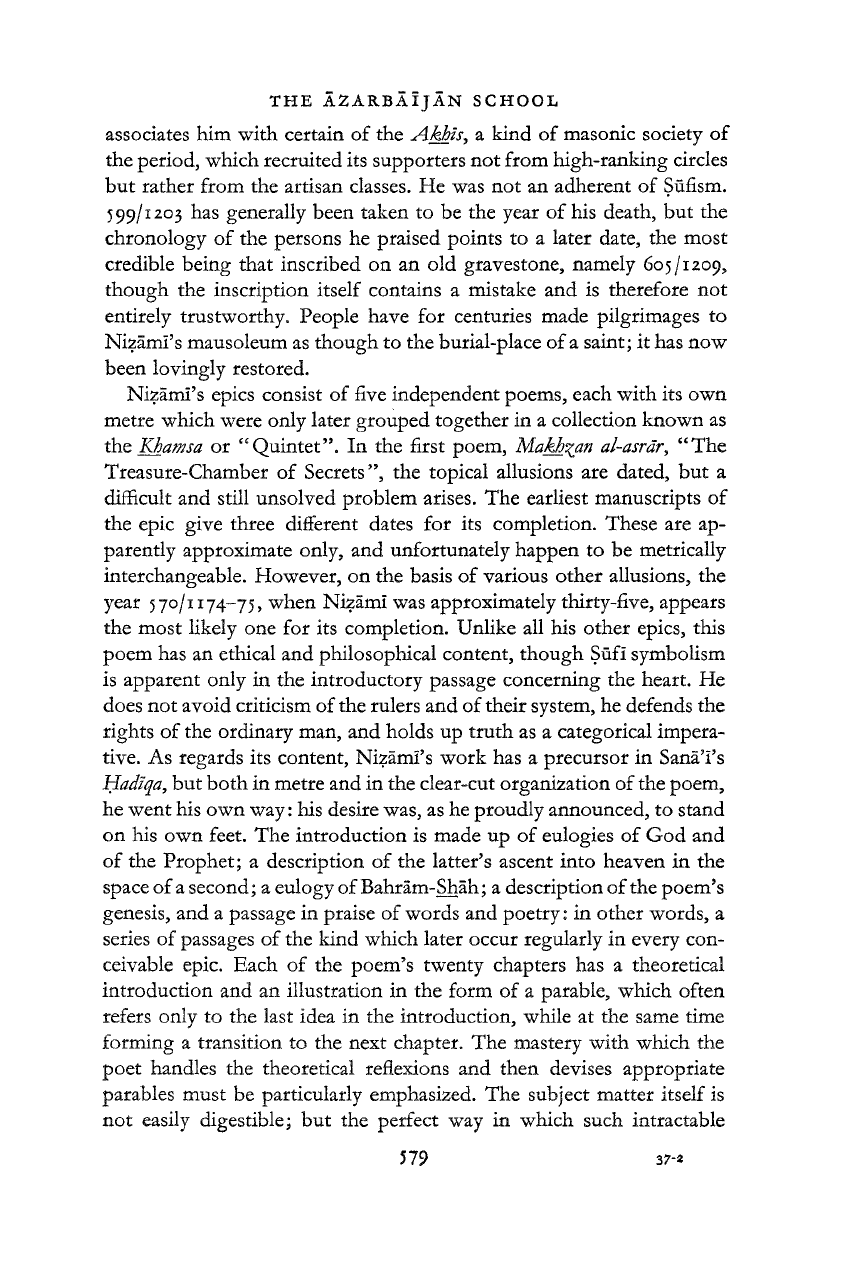
THE AZARBÀÏJAN SCHOOL
579
37-2
associates
him
with certain
of the Akhis, a
kind
of
masonic society
of
the period, which recruited its supporters not from high-ranking circles
but rather from
the
artisan classes.
He was not an
adherent
of
Süfism.
599/1203
has
generally been taken
to be the
year
of
his death,
but the
chronology
of the
persons
he
praised points
to a
later date,
the
most
credible being that inscribed
on an old
gravestone, namely 605/1209,
though
the
inscription itself contains
a
mistake
and is
therefore
not
entirely trustworthy. People have
for
centuries made pilgrimages
to
Nizami's mausoleum as though
to
the burial-place
of
a saint;
it
has
now
been lovingly restored.
Nizàmi's epics consist
of
five independent poems, each with
its own
metre which were only later grouped together
in a
collection known
as
the
Khamsa or
"Quintet".
In the
first poem,
Makh^an
al~asrar,
"The
Treasure-Chamber
of
Secrets",
the
topical allusions
are
dated,
but a
difficult
and
still unsolved problem arises.
The
earliest manuscripts
of
the epic give three different dates
for its
completion. These
are ap-
parently approximate only,
and
unfortunately happen
to be
metrically
interchangeable. However,
on the
basis
of
various other allusions,
the
year 570/1174-75, when Nizami was approximately thirty-five, appears
the most likely
one for its
completion. Unlike
all his
other epics, this
poem has
an
ethical and philosophical content, though Sufi symbolism
is apparent only
in the
introductory passage concerning
the
heart.
He
does not avoid criticism
of
the rulers and
of
their system,
he
defends
the
rights
of
the ordinary man,
and
holds
up
truth
as a
categorical impera-
tive.
As
regards
its
content, Nizami's work
has a
precursor
in
Sana'fs
Hadtqa,
but both
in
metre and
in
the clear-cut organization
of
the poem,
he went his own way:
his
desire was,
as he
proudly announced,
to
stand
on
his own
feet.
The
introduction
is
made
up of
eulogies
of God and
of
the
Prophet;
a
description
of the
latter's ascent into heaven
in the
space
of
a second;
a
eulogy
of
Bahràm-Shàh;
a
description
of
the poem's
genesis,
and a
passage
in
praise
of
words and poetry:
in
other words,
a
series
of
passages
of
the kind which later occur regularly
in
every con-
ceivable epic. Each
of the
poem's twenty chapters
has a
theoretical
introduction
and an
illustration
in the
form
of a
parable, which often
refers only
to the
last idea
in the
introduction, while
at the
same time
forming
a
transition
to the
next chapter.
The
mastery with which
the
poet handles
the
theoretical reflexions
and
then devises appropriate
parables must
be
particularly emphasized.
The
subject matter itself
is
not easily digestible;
but the
perfect
way in
which such intractable
